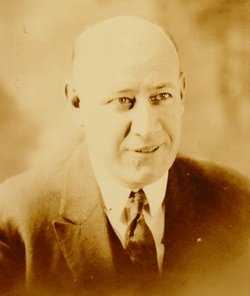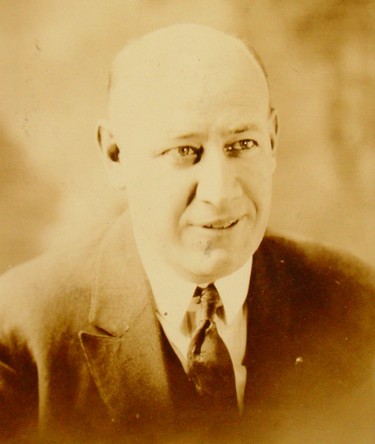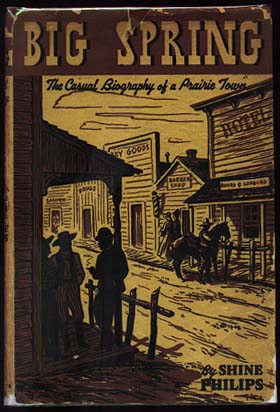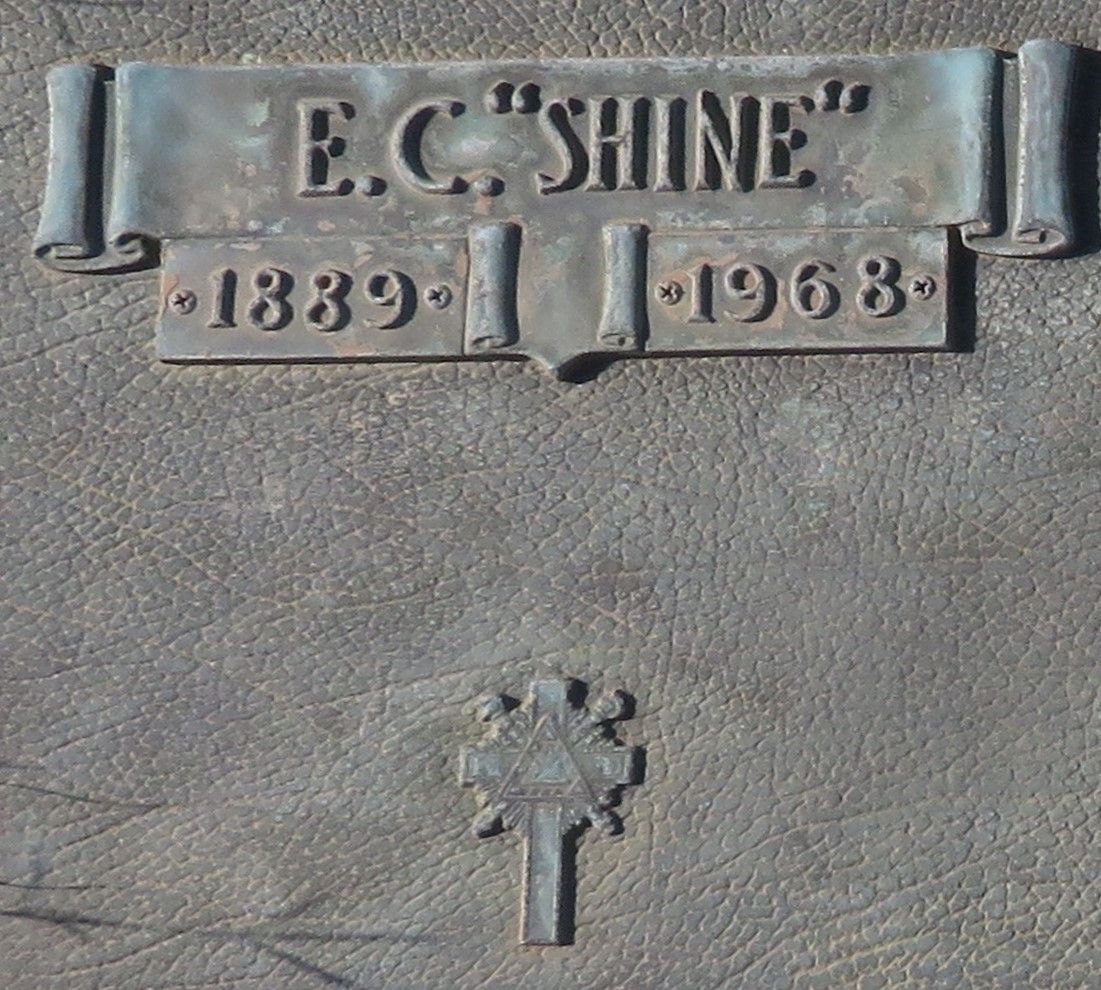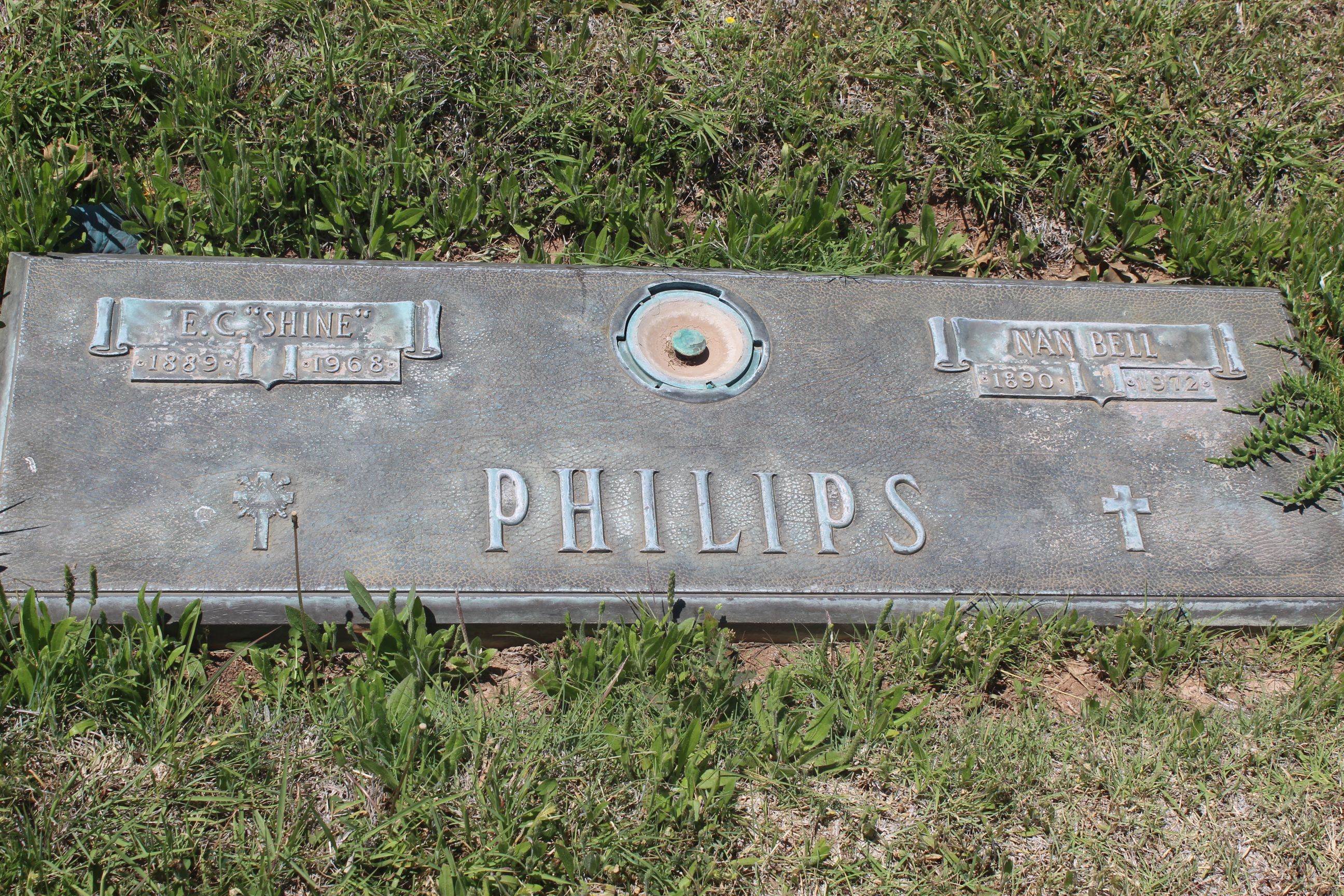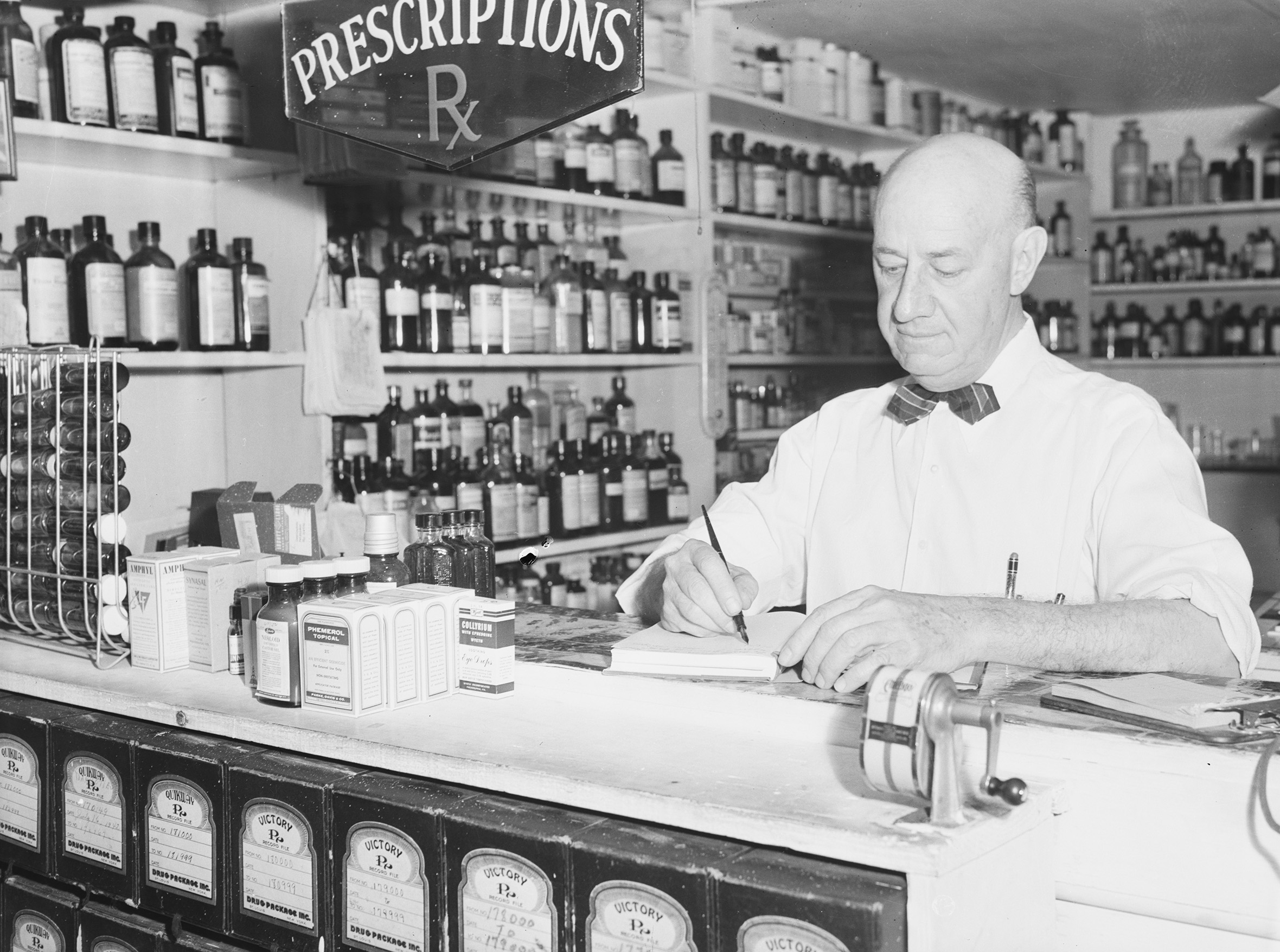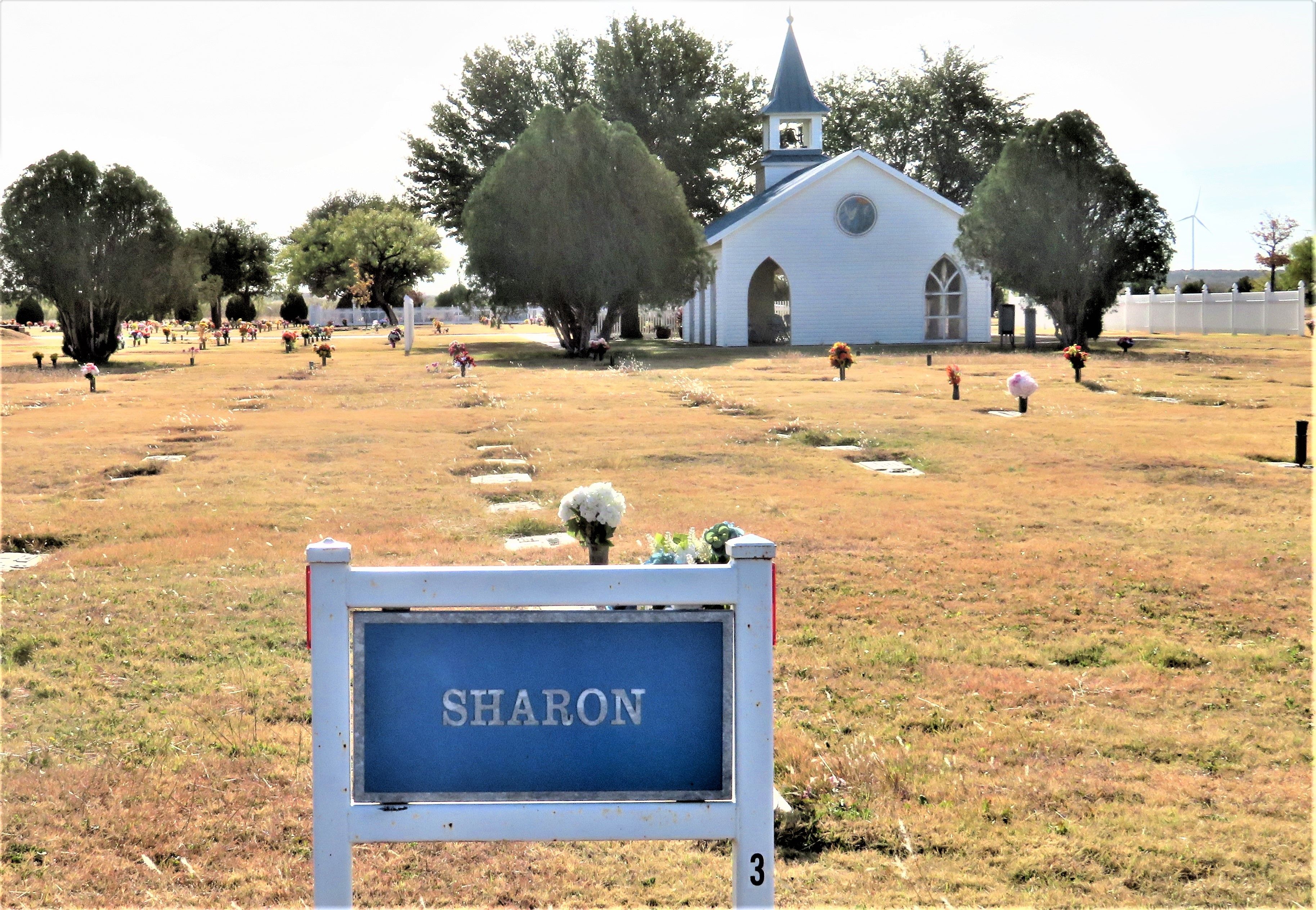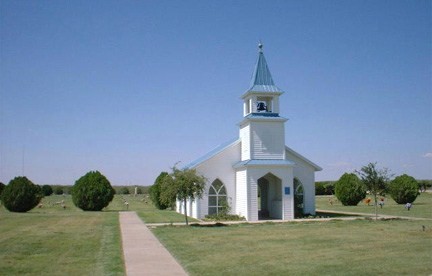Published in the Big Spring Daily Herald on Monday, March 4, 1968:
DRUGGIST, AUTHOR, PHILOSOPHER
Shine Philips, 79, Dies
Best Know For
His Unique Role
Shine Philips, 79, druggist, author, philosopher and foremost citizen of Big Spring, died here Monday morning.
Services will be held at the Nalley-Pickle Rosewood Chapel at 2:30 p.m. Tuesday with burial in the Trinity Memorial Park. The Rev. John Payne, rector of St. Mary's Episcopal Church will officiate, assisted by the Rev. Leo K. Gee, pastor of the First Methodist Church.
The family requested that those wishing to make memorials give to favorite charities.
Mr. Philips died shortly after 9:30 a.m. at Bennett House, which he had inspired and where he became the first guest when it opened Aug. 1, 1963.
Surviving him are his wife, Mrs. Nan Philips; two daughters, Mrs. Garth (Nancy) Jones, Austin, and Miss Champe Philips, who is doing graduate work at Texas Womens's University in Denton; and two granddaughters, Bronwyn and Tiffany Jones of Austin.
He also leaves a brother, Dr. Dan Philips, Mount Pleasant, Tenn., and a sister, Mrs. Bonnie Boswell, El Paso.
COMMUNITY LEADER
Until a series of strokes disabled him, Mr. Philips was one of the community's top leaders. He had served as president of the Big Spring Chamber of Commerce in 1929 when the city was in the throes of trebling its population in the wake of an oil boom. He also had been extremely active in pharmaceutical professional fields, but it was his role as homespun philosopher, humorist, writer, confidant, and neighbor that he was best know and most beloved.
Perhaps he was most famous for his book, "Big Spring, The Casual Biography of a Prairie Town," a flavorful story of his hometown which went through several printings. The plates were brought out of storage for another run three years ago.
This book inspired a convict in Tennessee state prison to write a cantata, which had its premiere here with its composer on furlough for the occasion.
ONLY AS 'SHINE'
Shine Philips was born Earl Grover Cleveland Philips, Feb. 7, 1889, but he later dropped the Grover. So far as the public was concerned the other was droped, too, for he was know for more than half a century only as Shine.
Oddly, he likely came by the name as a result of his activities as a shine boy after he came here in 1898, and it stuck when he became prematurely and completely bald. When he peddled the Dallas Morning News, he bore the nickname of Whistlin' Rufus. He gave up this career to bottle castor oil at Dr. D. W. McIntyre's drug store, the forerunner of the concern which he and associate purchased in 1919.
EARNED LICENSE
In the meantime, he had earned his pharmacy license at the University of Texas School of Pharmacy in Galveston and had a 10-months fling as a druggist in the hectic Ranger-Eastland oil boom. When he returned, he and the late C. W. Cunningham formed a partnership and bought out B. Reagan, his former schoolmaster and employer, to form Cunningham & Philips, a store still operating under that name.
Mr. Philips had been a member of the State Board of Pharmacy for 15 years and in 1956 finished his second term as president of the board. He was a former president of both the Texas Druggists Association and the West Texas Druggists Association. Once he was named national president of the States Association of Pharmaccutical Boards.
MARRIED
He was married Feb. 10, 1915, to Miss Nan Bell in Baird, and their many friends chartered two coaches on the Texas & Pacific railroad to make the wedding trip. When they celebrated their Golden Wedding anniversary her three years ago, they had a panoramic picture of the wedding party beside the coaches.
During the busy 1920's here, he was busy in the old Wednesday Luncheon Club, later the Rotary Club of which he was once president, and in the Chamber of Commerce. He never let up, even when he lost his partner and plunged into his book as a surcease for sorrow, or during the crush of World War II, when the Bombardier School was established. The Philips home was made literally into a home for military me - principally those of foreign extraction. Until his health failed, he continued to take a personal interest in foreign students stationed here. Military people by the hundreds acquired and read his book, thus his delightful version of early-day Big Spring was circulated around the world.
SELDOM
Shine described himself as a "paying Methodist," but he seldom attended services at the First Methodist Church where he was a member. Usually he spent Sunday mornings touring the city's hospitals, visiting patients, passing out goodies. Often times he chartered a bus to take patients of the Big Spring State Hospital for a ride.
He was head of the Red Cross chapter here for more than 25 years. There were years, he confessed, when some of the largest contribution came anonymously from Texas bootleggers. "There's some good in everybody," he often said.
He was a life member in Staked Plains Masonic Lodge 598, of Big Spring Chapter of Royal Arch Masons 178, Big Spring Council 117, Big Spring Commandery of Knights Templar 31, and of the Suez Temple of the Shrine.
HONORED
On Nov. 27, 1954, Shine Philips was honored during the halftime ceremonies at a homecoming football game when he was presented a diploma from Big Spring High School. This was 46 years after he had been expelled from school for refusing to apologize for a schoolboy prank he said he didn't do. His is the only diploma awarded to a non-graduate.
"They always blamed me for everything that happened, and they usually were right, but not this time," he said.
When the Centennial of the "discovery" of the big spring was observed in 1949, Mr. Philips became the president of the Centennial commission and one of its moving forces. After operating his drug store in the 200 block of Main Street for nearly 40 years, he "retired" in 1953 to the present location at 905 Johnson.
Put out of action in June, 1955, by a stroke, he was soon back at work in his prescription department, his glasses shoved up on his forehead and his battered portable typewriter serving to peck out prescriptions and common sense philosophy. The following year he was felled by a massive stroke which almost claimed his life and from which he never fully recovered. Fifteen weeks later, in October, he returned home, alert and in excellent spirits. Later he went to San Angelo to The West Texas Geriatrics Hospital, which had facilities better to serve him.
VISITING
Visiting him there one day, James Bruce Frazier, who had worked in the C&P drug store, determined to have a similar facility so that Shine could be near his friends. thus Bennett House was born, and Shine became its firs and most famous guest when it opened Aug. 1, 1963. Until his unexpected death, he still made the round in his wheel chair, his sparkle and smile undimmed and untarnished.
Published in the Big Spring Daily Herald on Monday, March 4, 1968:
DRUGGIST, AUTHOR, PHILOSOPHER
Shine Philips, 79, Dies
Best Know For
His Unique Role
Shine Philips, 79, druggist, author, philosopher and foremost citizen of Big Spring, died here Monday morning.
Services will be held at the Nalley-Pickle Rosewood Chapel at 2:30 p.m. Tuesday with burial in the Trinity Memorial Park. The Rev. John Payne, rector of St. Mary's Episcopal Church will officiate, assisted by the Rev. Leo K. Gee, pastor of the First Methodist Church.
The family requested that those wishing to make memorials give to favorite charities.
Mr. Philips died shortly after 9:30 a.m. at Bennett House, which he had inspired and where he became the first guest when it opened Aug. 1, 1963.
Surviving him are his wife, Mrs. Nan Philips; two daughters, Mrs. Garth (Nancy) Jones, Austin, and Miss Champe Philips, who is doing graduate work at Texas Womens's University in Denton; and two granddaughters, Bronwyn and Tiffany Jones of Austin.
He also leaves a brother, Dr. Dan Philips, Mount Pleasant, Tenn., and a sister, Mrs. Bonnie Boswell, El Paso.
COMMUNITY LEADER
Until a series of strokes disabled him, Mr. Philips was one of the community's top leaders. He had served as president of the Big Spring Chamber of Commerce in 1929 when the city was in the throes of trebling its population in the wake of an oil boom. He also had been extremely active in pharmaceutical professional fields, but it was his role as homespun philosopher, humorist, writer, confidant, and neighbor that he was best know and most beloved.
Perhaps he was most famous for his book, "Big Spring, The Casual Biography of a Prairie Town," a flavorful story of his hometown which went through several printings. The plates were brought out of storage for another run three years ago.
This book inspired a convict in Tennessee state prison to write a cantata, which had its premiere here with its composer on furlough for the occasion.
ONLY AS 'SHINE'
Shine Philips was born Earl Grover Cleveland Philips, Feb. 7, 1889, but he later dropped the Grover. So far as the public was concerned the other was droped, too, for he was know for more than half a century only as Shine.
Oddly, he likely came by the name as a result of his activities as a shine boy after he came here in 1898, and it stuck when he became prematurely and completely bald. When he peddled the Dallas Morning News, he bore the nickname of Whistlin' Rufus. He gave up this career to bottle castor oil at Dr. D. W. McIntyre's drug store, the forerunner of the concern which he and associate purchased in 1919.
EARNED LICENSE
In the meantime, he had earned his pharmacy license at the University of Texas School of Pharmacy in Galveston and had a 10-months fling as a druggist in the hectic Ranger-Eastland oil boom. When he returned, he and the late C. W. Cunningham formed a partnership and bought out B. Reagan, his former schoolmaster and employer, to form Cunningham & Philips, a store still operating under that name.
Mr. Philips had been a member of the State Board of Pharmacy for 15 years and in 1956 finished his second term as president of the board. He was a former president of both the Texas Druggists Association and the West Texas Druggists Association. Once he was named national president of the States Association of Pharmaccutical Boards.
MARRIED
He was married Feb. 10, 1915, to Miss Nan Bell in Baird, and their many friends chartered two coaches on the Texas & Pacific railroad to make the wedding trip. When they celebrated their Golden Wedding anniversary her three years ago, they had a panoramic picture of the wedding party beside the coaches.
During the busy 1920's here, he was busy in the old Wednesday Luncheon Club, later the Rotary Club of which he was once president, and in the Chamber of Commerce. He never let up, even when he lost his partner and plunged into his book as a surcease for sorrow, or during the crush of World War II, when the Bombardier School was established. The Philips home was made literally into a home for military me - principally those of foreign extraction. Until his health failed, he continued to take a personal interest in foreign students stationed here. Military people by the hundreds acquired and read his book, thus his delightful version of early-day Big Spring was circulated around the world.
SELDOM
Shine described himself as a "paying Methodist," but he seldom attended services at the First Methodist Church where he was a member. Usually he spent Sunday mornings touring the city's hospitals, visiting patients, passing out goodies. Often times he chartered a bus to take patients of the Big Spring State Hospital for a ride.
He was head of the Red Cross chapter here for more than 25 years. There were years, he confessed, when some of the largest contribution came anonymously from Texas bootleggers. "There's some good in everybody," he often said.
He was a life member in Staked Plains Masonic Lodge 598, of Big Spring Chapter of Royal Arch Masons 178, Big Spring Council 117, Big Spring Commandery of Knights Templar 31, and of the Suez Temple of the Shrine.
HONORED
On Nov. 27, 1954, Shine Philips was honored during the halftime ceremonies at a homecoming football game when he was presented a diploma from Big Spring High School. This was 46 years after he had been expelled from school for refusing to apologize for a schoolboy prank he said he didn't do. His is the only diploma awarded to a non-graduate.
"They always blamed me for everything that happened, and they usually were right, but not this time," he said.
When the Centennial of the "discovery" of the big spring was observed in 1949, Mr. Philips became the president of the Centennial commission and one of its moving forces. After operating his drug store in the 200 block of Main Street for nearly 40 years, he "retired" in 1953 to the present location at 905 Johnson.
Put out of action in June, 1955, by a stroke, he was soon back at work in his prescription department, his glasses shoved up on his forehead and his battered portable typewriter serving to peck out prescriptions and common sense philosophy. The following year he was felled by a massive stroke which almost claimed his life and from which he never fully recovered. Fifteen weeks later, in October, he returned home, alert and in excellent spirits. Later he went to San Angelo to The West Texas Geriatrics Hospital, which had facilities better to serve him.
VISITING
Visiting him there one day, James Bruce Frazier, who had worked in the C&P drug store, determined to have a similar facility so that Shine could be near his friends. thus Bennett House was born, and Shine became its firs and most famous guest when it opened Aug. 1, 1963. Until his unexpected death, he still made the round in his wheel chair, his sparkle and smile undimmed and untarnished.
Family Members
Sponsored by Ancestry
Advertisement
Explore more
Sponsored by Ancestry
Advertisement
